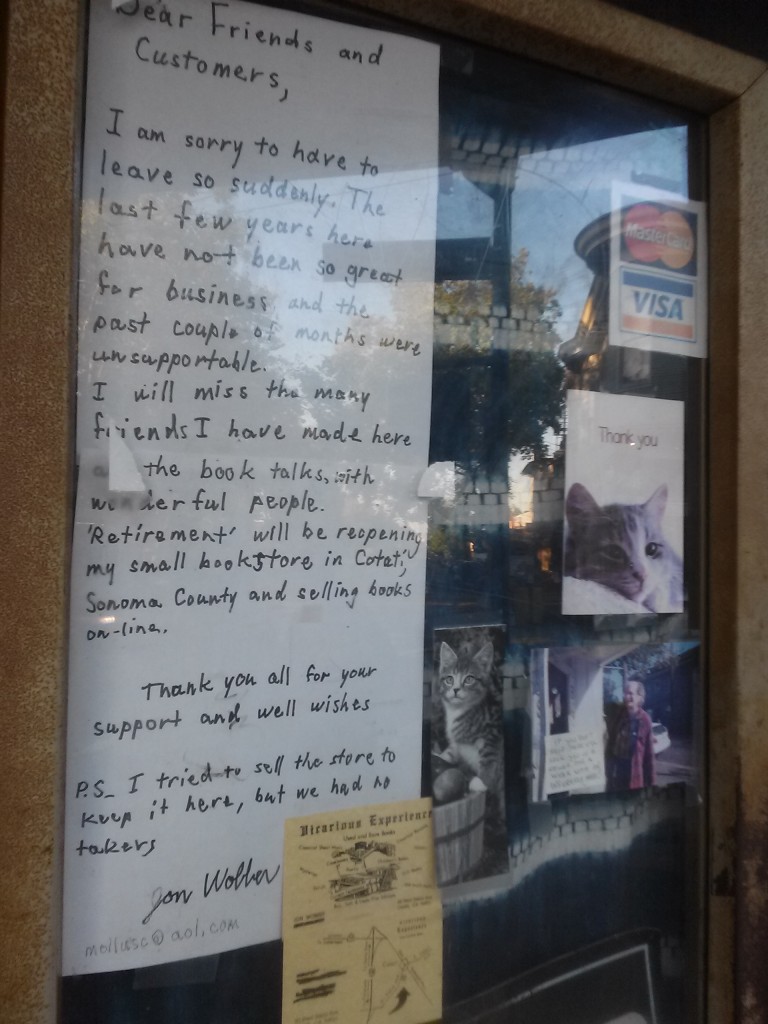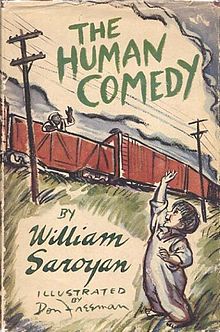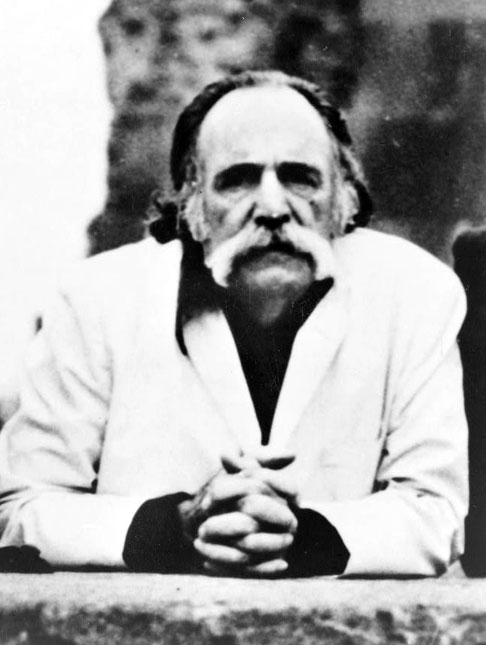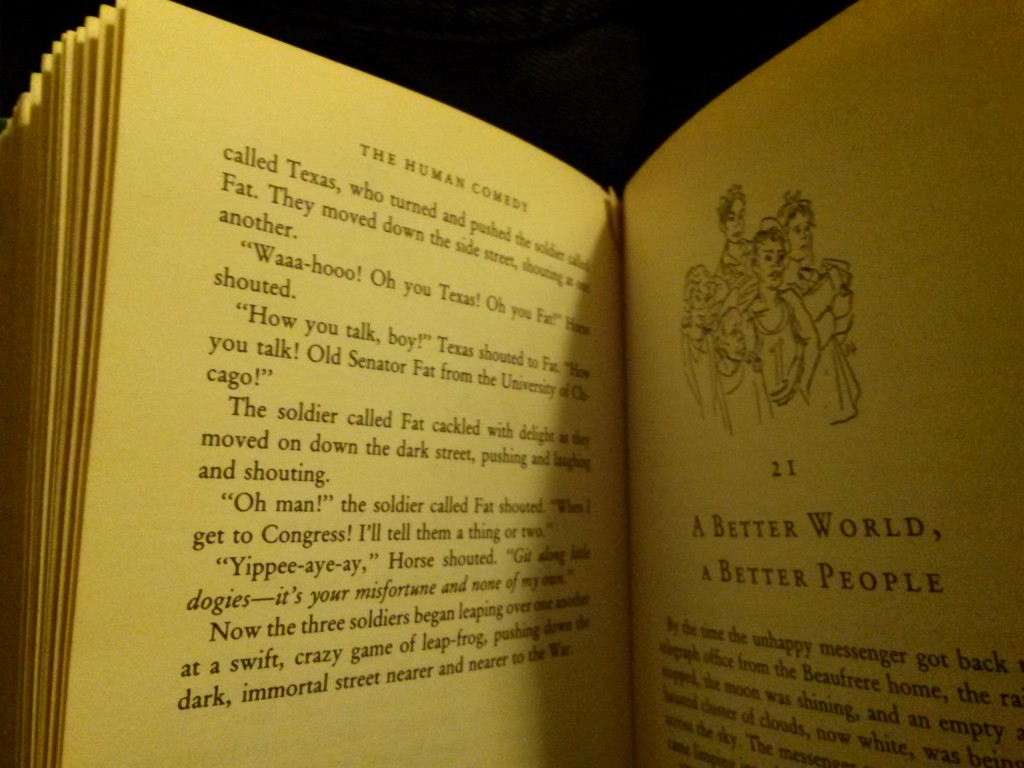William Saroyan You Go Your Way I'll Go Mine Read
I learned a lot well-nigh books — more than I'd meant to — while preparing a web log post last month. It's a personal story, full of real highs and some real frustrations, and a few moments of honest-to-god history. And it all ends up with a picture of a little male child waving at a train…
I was thrilled when my book club finally agreed to read 1 of my all-fourth dimension favorite novels. But could I nevertheless find a hardcover version of the original 1943 novel? By the end of that evening, I'd visited six dissimilar bookstores, and simply ane of them had a re-create on their shelves. But even more than startling, I discovered that ii of my favorite bookstores had gone out of business organisation!
Airtight
Nothing by the Writer…
Only one obscure volume past the author…
Out of business
Had the volume!
Out of concern

After fifty years, Berkeley'southward "Shakespeare & Co." closed in June of 2015
In the terminate, it was easier to just purchase the volume on Amazon — especially since I was able to locate both editions. (The revised 1966 Dell paperback, and the original Harcourt Brace and Co. hardcover from 1943). And I was delighted that I'd even plant a version with the original dust jacket… William Saroyan had won a Pulitzer Prize but three years before he wrote The Human Comedy. So information technology felt tragic that information technology was so hard to detect a bookstore that would sell me a re-create — and very of import that I pursue this to wherever information technology led…
I'd live with these books for the next month, revisiting its story of small-town America — and discovering all the startling differences between the original and revised editions. And the very outset departure I discovered was pretty substantial — every affiliate'due south title had been changed. "All the Earth Volition Be Jealous of Me" had get simply "At Domicile", and "You Become Your Mode, I'll Go Mine" had become "Mrs. Sandoval." Soon I was stunned to discover that that pattern was repeating for every single chapter, which suggested more rich details that might be slipping away…
| A Vocal For Mr. Grogan | Mr. Grogan |
| If a Message Comes | Mrs. Macauley |
| Be Nowadays at Our Table, Lord | Bess and Mary |
| Rabbits Around Here Somewhere | The Veteran |
| The Two-20 Low Hurdle Race | Miss Hicks |
| The Trap, My God, the Trap! | Big Chris |
| I'll Have You Home Again | Going Home |
| Mr. Grogan on the War | The Telegram |
| To Female parent, with Love | Alan |
| It'south Your Misfortune and None of My Own | Later the Movie |
| A Better World, a Meliorate People | Valley Champion for Kids |
| Let There Exist Light | The Holdup Man |
| Death, Don't Become To Ithaca | The Nightmare |
| Be Happy! Be Happy! | Mr. Ara |
| There Will Always Be Pain in Things | Mrs. Macauley |
| All The Wonderful Mistakes | Lionel |
| Leaning on the Everlasting Arms | On the Train |
| A Letter from Marcus to His Brother Homer | Marcus |
| Here is a Osculation | At the Church building |
| The Trees and the Vines | Spangler |
| Ithaca, My Ithaca! | Ithaca |
| Honey Is Immortal, Detest Dies Every Infinitesimal | The Horseshoe Pitchers |
| The End and the Beginning | The Business firm |
Look a minute — there's 2 unlike capacity that are both named "Mrs. Macauley." (Come across what happens when you name capacity after their primary character?) Information technology was fun exploring the volume for its changes, both big and pocket-size, and the 2d departure I discovered was simply one give-and-take in the first affiliate. But information technology still seemed like it was a pretty important change…
The picayune boy turned slowly and started for home. Equally he moved, he still listened to the passing of the railroad train…and the joyous words: "Going home, boy — going back where I belong!" He stopped to remember of all this, loitering beside a china-ball tree and kicking at the xanthous, smelly, fallen fruit of information technology. After a moment he smiled the smile of the Macauley people — the gentle, wise, secret smile which said Yes to all things.
In the revised edition, "Yeah" was changed to "Hi".
I even discovered a new typo that was introduced in the revised edition. (Unless "indredible" is a word.) Only more importantly, in chapter three, they've trimmed the chat where the manager of the telegraph office asks his 14-yr-sometime messenger nigh what future he's mapped out for himself. "Well… I don't know for sure, but I guess I'd like to be somebody some solar day. Maybe a composer or somebody like that — some day."
"That's fine," Spangler said, "and this is the identify to start. Music all around you — real music — directly from the earth — straight from the hearts of people. Hear those telegraph keys? Beautiful music."
"Yes sir," Homer said.
In the revised edition, the conversation goes like this.
"Well… I don't know for sure, but I gauge I'd like to be somebody some day."
"Yous will be," Spangler said.
I wondered if the writer was trying to shorten the volume — to brand it more like a paperback, for mass-market consumption. (The sentence "You lot know where Chatterton's bakery is?" was changed to "Know where Chatterton's bakery is?") It'south similar watching deleted scenes from a movie. Sometimes you sense that it made the moving picture shorter, but at the aforementioned fourth dimension it's as well eliminated some context.
An entire chunk of dialogue was cut from the end of the scene at the telegraph function.
"Mr. Grogan went on, his mouth full of cocoanut cream. 'Do you feel this world is going to be a better place after the War?'
Homer idea for a moment and and so said, 'Yes, sir.'
'Do you like cocoanut cream?' Mr. Grogan said.
'Yes, sir,' Homer said.
Are these meaning changes? If a story'due south forcefulness lies in its poignancy, then how practise you measure the value of dialogue? Here'south some more sentences that were edited out of chapter 4, when the smallest boy wanders into a conversation with his mother and older sister, request almost the blood brother who's gone away to war.
"Where's Marcus?"
Mrs. Macauley looked at he boy.
"You must endeavor to understand," she began to say, then stopped.
Ulysses tried to understand but didn't know just what was to be understood.
"Understand what?" he said.
"Marcus," Mrs. Macauley said, "has gone away from Ithaca."
"Why?" Ulysses said.
"Marcus is in the Army," Mrs. Macauley said.
In the revised edition, that scene was shortened to only two sentences.
"Where'due south Marcus?"
"Marcus is in the Army," Mrs. Macauley said.


It's a legend. The Pulitzer Prize-winning dramatist was fired from MGM's flick The Human Comedy in 1943. So he adapted his screenplay into a novel, and released it when the film premiered. Then the film was ultimately nominated for five Oscars (including "Best Moving-picture show") and won the "Best Story" Oscar for its fired author himself, William Saroyan. Later, Louis B. Mayer would remember this as his all-time favorite film…
Merely Amazon tipped me off to some other shocking chapter in the story well-nigh the story. More than 20 years later, in 1966, William Saroyan revised his novel yet over again — and it was released as a shorter Dell paperback. "The Human being Comedy is one of the almost beautifully written books I've ever read," wrote i reviewer on Amazon, "so when I opened this paperback version, I was devastated to realize that the unthinkable had occurred– the text had been altered!" 53 different Amazon customers nodded their virtual agreement to the criticism — or at least, marked the review equally helpful. "The ending that I had and so cherished in an old hardback version had been hastily re-written, going so far as to conclude with a completely different final sentence."
This review led me to my ain comparison of the 2 editions — and I've created a table documenting just how unlike the two editions are. Entire passages take been deleted, near the music of the earth, and nearly how nothing good ever really ends. "I do not know how a publisher could in good conscience alter the work of such an extraordinarily gifted writer…" the Amazon reviewer complained. "The Human Comedy is an incredibly moving volume and, unfortunately, this paperback edition does not do it justice."

The hardback edition was 291 pages long, the paperback simply 192. But at present a community of readers — the book's invisible fans — were inspiring me. I spent a few weekends immersing myself in both books, savoring William Saroyan'southward stirring portrayal of small-scale-town America — and of life itself. (I'yard not the only fan of this novel. Tom Hanks will be actualization in a new film of the book coming out in December, which will also star Meg Ryan and Sam Shepherd…)
At that place were some more than startling secrets in other Amazon reviews. 1 schoolteacher had lived virtually the real California town on which Saroyan based the book. After 42 years of teaching, she'd retired, and and so in 1999 visited Amazon to share her own insights. The telegraph role described in the novel — as well as the winery — were both real-life businesses which she'd had her students locate on a map! And she announced that she'd be collaborating with Saroyan'due south grand-niece on a higher grade sharing memories about the famous novelist.
Another Amazon reviewer wrote that she'd read the book three times, each at a different point in her life, and each time finding that it had a different flavor. ("This book is like vino; it becomes vintage as you get older…") But she also shared another fascinating piece of trivia. Saroyan lost his male parent at an early age, and his uncle — who became a begetter figure to him — "was taken to state of war and that was the last he saw of him." Throughout his novel, the young children in the family grapple with the absence of their own father. "Saroyan dedicated the story to his mother. This is a key chemical element of the story…"
I have my own piece of trivia to share. The same yr that the volume was published, William Saroyan was married — and he seems to have named i of the characters after his wife. Throughout the novel, a telegram boy worries about his older brother Marcus, who is serving in World War II. In 1943, William Saroyan married a woman named Carol Marcus.
It's fun to participate in this behemothic conversation virtually a cherished novel. "I acknowledge I cried at the cease of information technology," wrote one reviewer. And some other wrote enthusiastically that this was truly "The Great American Novel." ("Read it or suffer a less fulfilling life than you could have had…")
But make sure that you're reading the right edition!

I'1000 thrilled to find ane of my favorite authors has finally arrived on the Kindle — William Saroyan. In fact, one of my first blog posts here was about the bang-up American novel. Older novels have a dissimilar style — in that location's romantic novels from the 1800s, or rambling post-modern narratives from Ernest Hemingway. Simply around the 1940s, you get what I recall of as “The Smashing American Novelistsâ€. That is, people who were consciously setting out to write glorious, high-stakes pageants nearly life itself. And nobody embodied that better than William Saroyan.
Every human being is a adept man in a bad world… Every man himself changes from good to bad or from bad to good, back and along, all his life, and and then dies. Merely no matter how or why or when a man changes, he remains a good man in a bad world, as he himself knows…
That's from the 1952 novel Rock Wagram, and dorsum in 2010 I was calling Saroyan "the lost novelist", because you couldn't find his novels on the Kindle. (Later I fifty-fifty started calling him "The Author You Tin't Read on your Kindle".) I'd worried that somehow he might non brand the leap into the adjacent century, which made it experience that much more poignant when I discovered that an anonymous web surfer had discovered my web log mail most Saroyan by typing in that quote. (Ane more anonymous good man lost in a bad world….)
But four months ago, Saroyan's books suddenly started appearing in Amazon'south Kindle Shop. The William Saroyan Reader is a not bad place to kickoff, and it includes an amazing story about the author's life. HIs son Aram shares a stunning passage from "The Summer of the Beautiful White Horse" in the book's preface.
One day back there in the expert old days when I was nine and the earth was full of every imaginable kind of magnificence, and life was yet a delightful and mysterious dream my cousin Mourad, who was considered crazy by everybody who knew him except me, came to my firm at 4 in the morning and woke me upward by tapping on the window of my room.
Aram, he said.
I jumped out of bed and looked out the window.
I couldn't believe what I saw.
It wasn't morning withal, but information technology was summer and with daybreak non many minutes around the corner of the globe it was low-cal enough for me to know I wasn't dreaming.
My cousin Mourad was sitting on a beautiful white horse.
Saroyan's son says "If in that location is some other single page of prose that better evokes the wonder and mystery of childhood, I would love to know about it." But then he also points out that his male parent actually spent his ain childhood — from the ages of iii to eight — growing up in an orphanage. (Saroyan's own begetter — a poet and a minister — had died at the age of 37.) Years later Saroyan won a Pulitzer Prize — and in a particularly flamboyant gesture, he actually turned it down! His son speculates that was Saroyan'south way of thumbing his nose at the "officialdom" that seemed so disinterested during his babyhood in the orphanage. And he adds that Saroyan later faced expiry itself with that aforementioned wide-eyed and boyish sense of wonder…
The story nearly his time in the orphanage is especially stunning because Saroyan'southward novels have a special warmth to them — a "camaraderie", his son calls it — "a dark cheer…a bloodshot verse." Mayhap that's what makes it so much more poignant that his stories have now re-awakened in the year 2015, freshly available as ebooks for a new generation of readers. Non every book has arrived yet — we're still waiting for the Kindle edition of "The Human One-act," which is probably Saroyan'due south all-time-known novel. But in the last four months ebook editions have finally appeared for Rock Wagram, Boys and Girls Together, The Laughing Thing, The William Saroyan Reader, and Chance Meetings — Saroyan'due south own memoir.
And a slap-up American novelist finally gets a chance to reach a brand new audience.
Lately my most popular postal service is the i virtually William Saroyan — the 1940s novelist who actually turned down a Pulitzer Prize for literature. I'd called him "The Writer You Can't Read on your Kindle," and while it's yet true, there's something that's virtually as adept. There'south a fascinating biography about Saroyan's wild life — and the ebook's ii mod-day authors include one of my favorites.
Barry Gifford wrote Wild at Heart, a story about two passionate merely unlucky drifters living together on the road. David Lynch adapted it into a movie starring Nicolas Cage and Laura Dern, and when I saw Gifford speak in the early 90s, he was also working on a movie adaptation of Jack Kerouac'southward On The Road. Gifford was hosting a film noir festival, arguing there was a unspeakable truth in the best of the B-movies. Gifford seemed comfy with the grittier side of literature, and tonight I discovered he'd co-authored this detailed biography of William Saroyan.
"Along with Ernest Hemingway, William Saroyan…was the well-nigh well-known American writer of the 1930s and 1940s," according to Amazon'south description of the book, and the ii authors "heard Saroyan'due south story first-hand from Carol Matthau, the wife he rejected; the son and daughter he alternately smothered and pushed abroad; and colleagues like Artie Shaw, Celeste Holm, and Lillian Gish." (The Boston Herald called information technology a "beautifully balanced account" of the "triumphs and agonies" in the writer's life.) I think Barry Gifford understands the zest and exuberance that Saroyan brought to his work — and to his life.
And coincidentally, yous besides can't read Gifford's Wild at Heart on the Kindle either. (Though you can purchase i of its sequels, The Imagination of the Heart, which Gifford published just final yr at the age of 63…)
I'm excited nearly this book because Saroyan lived a fascinating life. As a young boy he'd lived in an Oakland orphanage, and later on served in the army during World War Ii at the peak of his writing career. (It was just two years later he'd declined the Pulitzer Prize, and 2 years earlier his Academy Award for Best Writing, Original Story.) According to Wikipedia he "worked chop-chop, inappreciably editing his text, and drinking and gambling away much of his earnings." And if that weren't enough, he "narrowly avoided a court martial when his novel The Adventures of Wesley Jackson was seen as advocating pacifism!"
In February, I'd worried that "he'll exist one of those authors who won't transition into the next generation of media. In our shiny future, we'll have expensive 'readers' with fancy new features — merely with a couple of last-century authors who somehow simply didn’t brand the cut." So I always become a warm feeling when the digital world finds its style to a fiddling bit of Saroyan. Maybe instead of talking well-nigh the human, or his biography, or his biographer, I should just share his advice to young writers of the futurity.
"Try to learn to exhale deeply; really to taste food when you eat, and when you lot sleep really to slumber. Try as much as possible to be wholly alive with all your might, and when you lot laugh, laugh like hell."
William Saroyan won a Pulitzer Prize — which he refused to take. And the author wrote a wonderful scene about books at a public library in his novel "The Human One-act."
But the scene is entirely different if you lot watch the movie.
Saroyan quarrelled bitterly with the moving picture's producers, and really wrote a novel-version of the pic, afterwards-the- fact, to try to brand the story more than hard-hit. In the movie, the kindly librarian tells two niggling boys that she'south been reading books for more than 70 years.
"And it still isn't enough time."
This night I looked up the same scene in Saroyan'southward book version. The ii boys nevertheless visit the librarian, and she gives the same speech. But in the book, she but insists that she'south been in the globe reading books for sixty years.
"And it hasn't fabricated one bit of difference!"
It's a interesting counterpoint to the life of William Saroyan. His popularity declined, and he eventually funded a foundation to publish his works — possibly merely to shore upwards his legacy. So it'south interesting what happens when y'all wait for Saroyan ebooks for the Kindle.
You don't find any.
But you do find a biography about his bittersweet life…
William Saroyan You Go Your Way I'll Go Mine Read
Source: http://www.beyond-black-friday.com/tag/william-saroyan/
0 Response to "William Saroyan You Go Your Way I'll Go Mine Read"
Post a Comment